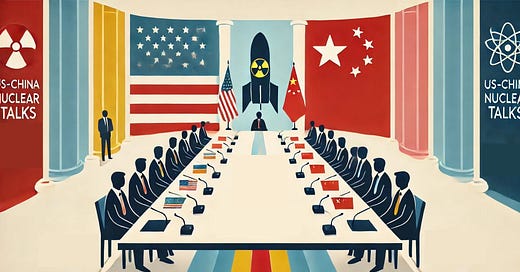PREAMBLE
Original article is published by
World Affairs (世界知识) on 4 September 2024;
Translated by Jan Brughmans
The introduction is by Jingdong Yuan, Director of SIPRI’s China and Asia Security Programme. Jingdong has a particular interest in nuclear arms control, nonproliferation and, more broadly, China’s international relations. He is the co-author of A Low-Visibility Force Multiplier: Assessing China's Cruise Missile Ambitions and is currently completing a book manuscript on China–South Asia relations. — Thomas
a reposting from sinification
In the current environment, where the United States and China increasingly find themselves in disagreement on a broad range of issues from the Taiwan Strait to the South China Sea, the risks of Sino-US disputes over them escalating into major military conflicts, including nuclear use, require greater attention and efforts in crisis prevention and management. Liu Chong’s observation of the recent track-II bilateral dialogues on arms control and strategic issues provides useful insights into both the challenges and imperatives of seeking common understanding and avenues for potentially one of the most destabilising—and highly consequential—aspects of their relationship.
Three general comments are presented here. First, it is clear that both Beijing and Washington recognise the importance of meaningful and regular dialogues on arms control and strategic issues at both the official and unofficial level. Over the past decades, both sides have engaged in such dialogues, achieving some progress, particularly in the nonproliferation domain.
Secondly, there are major barriers to both levels of dialogues due to their respective approaches to and incentives for sustaining such engagement. For China, a broader political/diplomatic perimeter is required for any meaningful and mutually beneficial dialogues that advance core interests of either or both parties. The numerous disruptions of the process are largely due to what China perceives as persistent US dismissal of, or even deliberate detrimental actions to, China’s fundamental national interests—US arms sales to Taiwan and increasingly frequent official interactions with Taiwanese counterparts, despite the three joint communiqués.
Thirdly, there remain significant divergences in the understanding, interests, and interpretations of key concepts, including what constitutes strategic stability and the role of nuclear weapons, their qualitative and quantitative development, and deployment modes. Analysts are increasingly worried about the lack of crisis communication in the bilateral context, especially where nuclear weapons are concerned, and stress the need to move toward exploring, designing and introducing effective communication channels. Given the rise of critical and disruptive technologies, and their potential applications in strategic systems, including both conventional and nuclear weapons, it becomes even more imperative for both sides to look for ways to respond to and manage these developments.
Liu is clearly cognisant of the risks and the necessity of such engagement, and it is hoped that his insights will resonate with sympathetic audiences in both governments and at the track-II level.
Jingdong Yuan
Key Points
The US and China resumed in-person Track II nuclear arms talks in March for the first time since the pandemic.
However, past understandings are eroding, raising the risk of misconceptions and misjudgments.
For example, the US side seems unwilling to accept that mutual vulnerability requires both countries having second-strike capabilities that ensure mutual destruction.
In their view, strategic stability can only be maintained if the current balance of power remains unchanged.
Chinese scholars disagree and argue that if the US is unwilling to accept a China with a credible nuclear inventory, this could suggest that Washington might one day consider a preemptive nuclear strike against China or use the threat of such a strike as nuclear blackmail.
On account of the current disparity in nuclear arsenals, Chinese scholars also contend that nuclear arms control talks should not be limited to the goal of disarmament alone.
Differences between China and the US are increasing. To address the rising risk of crises and conflicts, the two sides must develop a shared analytical framework.
If Moscow and Washington were able to establish such a framework during the Cold War, it should still be possible for China and the US to do so now.
The Author
Name: Liú Chōng (刘冲)
Age (estimate): 40
Position: Executive Director, Institute of International Security Studies, China Institutes of Contemporary International Relations (CICIR)
Other: Council member of the China Arms Control and Disarmament Association
Previously: Researcher at CICIR since graduating from Tsinghua University in 2008
Research focus: Strategic security; Arms control policy; International crisis management
Education: BA Tsinghua University (2006); MA Tsinghua University (2008); PhD CICIR (N/A)
Experience abroad: Unknown





